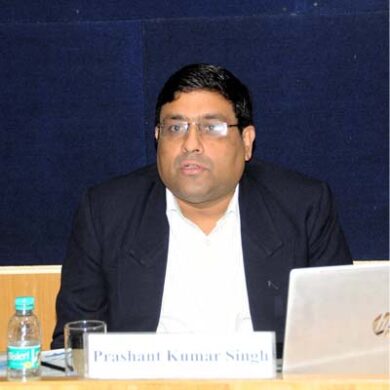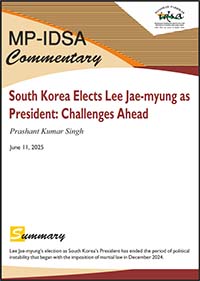South Korea Elects Lee Jae-myung as President: Challenges Ahead
- June 11, 2025 |
- IDSA Comments
Political instability in Seoul that began with former president Yoon Suk Yeol’s ill-considered imposition of martial law in the intervening night of 3–4 December 2024,[1] has finally ended with the Republic of Korea (or ROK, South Korea) electing Lee Jae-myung of the liberal Democratic Party of Korea (DPK) as its president on 3 June 2025.[2] Lee trounced his rival Kim Moon-soo from the People Power Party (PPP) by a convincing margin of more than 8 per cent, securing 49.42 per cent of total votes.[3] Lee was sworn-in as the president on 4 June.
Flawed Legacy of Yoon
Lee has assumed the presidency in the backdrop of the flawed legacy of Yoon. Yoon tarnished South Korea’s democratic credentials by attempting to impose martial law for vested political interests in the name of the need to counter “anti-state forces” who were “plotting rebellion”.[4] The offered pretext was so unconvincing that the entire nation opposed Yoon’s actions. The National Assembly compelled him to rescind the decree by promptly invalidating it and later impeached him for the act.
The episode left the nation in shock and outrage, reminding many of the vulnerability of their still-young democracy, which emerged out of its authoritarian phase in the late 1980s. The charges of financial impropriety against his wife, still under trial, also marred his legacy.[5] Ironically, while he emphasised a value-based alliance with the liberal world, and opposition to the politically loaded term ‘democratic backsliding’ found a place in his Indo-Pacific strategy, he was in the end accused of being autocratic and undemocratic.
Foreign policy is where Yoon shone relatively. He made a significant value addition to foreign policy in terms of furthering South Korea’s quest for foreign policy independence. He issued Indo-Pacific strategy, entitled Strategy for a Free, Peaceful, and Prosperous Indo-Pacific Region, in 2022. The concept of South Korea as a Global Pivotal State (GPS), enshrined in the strategy, saw an independent, expanded and enhanced role for South Korea in global affairs. The strategy reiterated South Korea’s partnerships, based on liberal democratic values, with the West and elsewhere.
Yoon recognised China’s importance as an important neighbour and big power, but emphasised tackling the challenge of Chinese power through strengthened alliances. He took measures to strengthen alliance with the US, improved relations with Japan and sought to engage China. On the other hand, he pursued a tough approach towards North Korea, deprioritising dialogue with it, and could be held equally responsible for the deterioration of the security situation in the Korean peninsula, along with North Korean leader Kim Jong Un.
Lee’s Promises of Reforms
In this background, the main task that Lee has set out for himself is rebuilding trust in South Korea’s democratic resilience. People’s anger against the martial law bid has yielded in massive public support for him. Park Chan-dae, DPK floor leader, acknowledged this, saying that the result was “a thunderous verdict by the sovereign people against a regime of rebellion”.[6]
South Korean commentators note that Lee’s promise of reforming the constitution to introduce effective checks and balances on executive authority resonated with the public and ensured his victory.[7] Lee promised “decentralizing executive authority and bolstering legislative oversight if elected”, which was viewed as “a direct response to escalating public demands for significant political change”.[8] In his inaugural speech, Lee declared that this was time to “… restore democracy, devastated by armored vehicles and automatic rifles”.[9] He vowed that
‘never again must a rebellion deprive the people of their sovereignty through weapons entrusted to protect them’ … and to ensure that ‘the military is never again used in politics’.[10]
He promised to fix responsibility and introduce mechanisms to prevent any recurrence of the episode.[11] Addressing the issue of deep political polarisation in the country, he promised that “regardless of whom you supported in this election, I will embrace all and serve all as the ‘president for everyone’, honouring your mandate for unity”.[12]
Lee’s Foreign Policy Priorities
Domestic politics and ideological leanings have had a tremendous influence on South Korea’s foreign policy. While the quest for foreign policy independence and the support for alliance with the US has bipartisan support, there is a deep cleavage along liberal and conservative lines in the society and polity when it comes to relations with China and Japan, and the nature of relations with North Korea.
The liberal political space, which the DPK belongs to, shows a relaxed approach towards China, is critical of Japanese colonialism and atrocities committed during that period such as forced labour and ‘comfort women’ in Korea, and supports engagement with North Korea. The conservative space, which the PPP belongs to, views China as a security challenge, favours a conciliatory approach towards Japan, considers North Korea as a threat not only to South Korea but to the entire region, and displays a preference for a US–Japan–South Korea trilateral security cooperation.
As his inaugural speech conveyed, Lee will continue to invest in expanding South Korea’s diplomatic reach, raising its international stature and enlarging its economy—core themes in Yoon’s Indo-Pacific strategy. The speech also conveyed his commitment to strengthening the alliance with the US and consolidating US–Japan–South Korea trilateral cooperation further.
However, his remarks that he will “approach relations with neighbouring countries through the lens of practicality and national interest” and that it was time to “reclaim national security and peace, which have been reduced to political weapons” indicate that he may reassess the state of relations with North Korea and China.[13] On North Korea, he pledged to counter its threats and provocations but reiterated dialogue for peace on the Korean Peninsula.[14] However, he did not mention China in the speech, though he had stood for improved relations with China during his election campaign. This omission has been seen as his way of maintaining a pragmatic balance.[15]
Foreign Policy Challenges
Maintaining a pragmatic balance between China and North Korea on one side, and the US and Japan on the other, will not be easy for Lee. The US will be chary of the prospect of China–South Korea cooperation, as it views China as its principal strategic rival and is engaged in a trade war with it. It expects coordination among its allies vis-à-vis China. The U.S. Department of State congratulated Lee on his election as the next president, stating that both countries “share an ironclad commitment to the Alliance grounded in [their] Mutual Defence Treaty, shared values, and deep economic ties”.[16] It also noted that it was “modernizing the Alliance to meet the demands of today’s strategic environment and address new economic challenges”.[17]
Further, the White House, in a somewhat ambiguous statement in response to media queries on the electoral outcome in South Korea, repeated that “the US-ROK Alliance remains ironclad”, but added that
while South Korea had a free and fair election, the United States remains concerned and opposed to Chinese interference and influence in democracies around the world.[18]
Its two statements taken together signal that the US may be anticipating divergences with South Korea in the coming period on the issue of engagement with China. Divergences and friction between them will have fallout for South Korea’s relations with Japan as well.
Meanwhile, from Beijing, President Xi Jinping sent his congratulations to Lee saying that “China and the ROK are important neighbours and cooperation partners”.[19] The Foreign Ministry Spokesperson Lin Jian remarked that
China-ROK relations are propelled fundamentally by the two countries’ common interests. The relations do not target any third party, and should not be disrupted by any third-party factor…[20]
Further responding to the White House’s statement, Lin said,
We urge the US to change the habit of assuming that China would act in the way that the US does, and stop trying to sow discord between China and the ROK.[21]
Conclusion
Thus, Lee’s election has ended political instability in South Korea. His approach towards the promised constitutional reforms and whether his government will truly honour the promises he has made or will simply perpetuate the cycle of retaliation against the opposition for the failed martial law bid, remains to be seen. Regional developments in the security and strategic realms will also be keenly watched.
Views expressed are of the author and do not necessarily reflect the views of the Manohar Parrikar IDSA or of the Government of India.
[1] Lee Sun-young, “What Unfolded on Tuesday Night in Seoul: A Timeline”, The Korea Herald, 4 December 2024.
[2] Ji Da-gyum, “South Korea Elects Lee Jae-myung President”, The Korea Herald, 3 June 2025.
[3] Ibid.
[4] Lee Sun-young, “What Unfolded on Tuesday Night in Seoul: A Timeline”, no. 1.
[5] Lee Si-jin, “Yoon Suk Yeol’s Apartment Raided over Wife’s Alleged Gifts”, The Korea Herald, 30 April 2025.
[6] Anna J. Park and Kim Bo-eun, “Lee Jae-myung Pledges to Integrate Polarized Nation”, The Korea Times, 3 June 2025.
[7] Lee Hyo-jin, “Voter Anger Over Yoon Suk Yeol’s Martial Law Propels Lee Jae-myung to Victory”, The Korea Times, 4 June 2025.
[8] Bahk Eun-ji, “Lee Jae-myung Vows to Curb Executive Powers”, The Korea Times, 4 June 2025.
[9] “Full Text: Lee Jae-myung’s Inaugural Speech”, The Korea Times, 4 June 2025.
[10] Ibid.
[11] Ibid.
[12] Ibid.
[13] Ibid.
[14] Ibid.
[15] Choe Sang-Hun, “South Korea’s New Leader Name Checks North Korea but Not China”, The New York Times, 4 June 2025.
[16] “Election of Republic of Korea President Lee Jae-myung”, Statement of Secretary of State Marco Rubio, U.S. Department of State, 3 June 2025.
[17] Ibid.
[18] Jeff Mason and David Brunnstrom, “White House Calls South Korea Election ‘Fair,’ Expresses Concern about Chinese Influence”, Reuters, 4 June 2025; Song Sang-ho, “White House Affirms ‘Ironclad’ Alliance after Lee’s Win”, Yonhap News Agency, 4 June 2025.
[19] “Xi Jinping Sends a Congratulatory Message to President-elect of the Republic of Korea Lee Jae-myung”, Foreign Ministry of People’s Republic of China, 4 June 2025.
[20] “Foreign Ministry Spokesperson Lin Jian’s Regular Press Conference”, Foreign Ministry of People’s Republic of China, 4 June 2025.
[21] Ibid.






